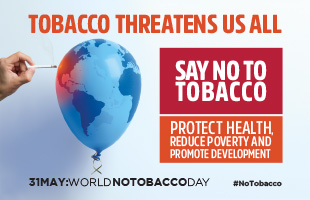
The World Health Assembly created World No Tobacco Day in 1987 to draw global attention to the tobacco epidemic and its lethal effects. It provides an opportunity to highlight specific tobacco control messages and to promote adherence to the WHO Framework Convention on Tobacco Control. Tobacco use is the number one preventable epidemic that the health community faces.
Tobacco – a threat to development
The World No Tobacco Day 2017 campaign demonstrates and raises awareness about the threats that the tobacco industry poses to the sustainable development of all countries, including the health and economic well-being of their citizens.
Based on the solid foundation that tobacco control supports health and development, WHO is calling on countries to prioritize and accelerate tobacco control efforts as part of their responses to the 2030 Agenda for Sustainable Development.
All countries benefit from successfully controlling the tobacco epidemic, above all by protecting their citizens from the harms of tobacco use and reducing its economic toll on national economies. The aim of the Sustainable Development Agenda, and its 17 global goals, is to ensure that "no one is left behind."
Tobacco control has been enshrined in the Sustainable Development Agenda. It is seen as one of the most effective means to help achieve SDG target 3.4 of a one-third reduction globally, by 2030, of premature deaths from noncommunicable diseases (NCDs), including cardiovascular disease, cancers and chronic obstructed pulmonary disease. Strengthening implementation of the WHO Framework Convention on Tobacco in all countries is an additional target to be met by governments developing national sustainable development responses.
Controlling tobacco helps achieve other global goals
In addition to saving lives and reducing health inequalities, comprehensive tobacco control contains the adverse environmental impact of tobacco growing, manufacturing, trade and consumption. Tobacco control can break the cycle of poverty, contribute to ending hunger, promote sustainable agriculture and economic growth, and combat climate change. Increasing taxes on tobacco products can also be used to finance universal health coverage and other development programs of the government.
It is not only governments who can step up tobacco control efforts: people can contribute on an individual level to making a sustainable, tobacco-free world. People can commit to never take up tobacco products. Those who do use tobacco can quit the habit, or seek help in doing so, which will in turn protect their health as well as people exposed to second-hand smoke, including children, other family members and friends. Money not spent on tobacco can be, in turn, used for other essential uses, including the purchase of healthy food, healthcare and education.
Facts about tobacco, tobacco control and the development goals
- More than 7 million deaths from tobacco use every year, a figure that is predicted to grow to more than 8 million a year by 2030 without intensified action. Tobacco use is a threat to any person, regardless of gender, age, race, cultural or educational background. It brings suffering, disease, and death, impoverishing families and national economies.
- Tobacco use costs national economies enormously through increased health-care costs and decreased productivity. It worsens health inequalities and exacerbates poverty, as the poorest people spend less on essentials such as food, education and health care. Some 80% of premature deaths from tobacco occur in low- or middle-income countries, which face increased challenges to achieving their development goals.
- Tobacco growing requires large amounts of pesticides and fertilizers, which can be toxic and pollute water supplies. Each year, tobacco growing uses 4.3 million hectares of land, resulting in global deforestation between 2% and 4%. Tobacco manufacturing also produces over 2 million tonnes of solid waste.
- The WHO Framework Convention on Tobacco Control (WHO FCTC) guides the global fight against the tobacco epidemic. The WHO FCTC is an international treaty with 180 Parties (179 countries and the European Union). Today, more than half the world’s countries, representing nearly 40% of the world’s population (2.8 billion people), have implemented at least one of the WHO FCTC’s most cost-effective measures to the highest level. An increasing number of countries are creating firewalls to ward off interference from the tobacco industry in government tobacco control policy.
- Through increasing cigarette taxes worldwide by US$1, an extra US$190 billion could be raised for development. High tobacco taxes contribute to revenue generation for governments, reduce demand for tobacco, and offer an important revenue stream to finance development activities.
Latest news and press releases
- Joint campaign promotes “respect” for health and Viet Nam’s smoke-free laws
27 September 2018 - Smoking causes 40 000 deaths in Viet Nam each year
27 May 2018 - World No Tobacco Day 2017: Beating tobacco for health, prosperity, the environment and national development
31 May 2017
